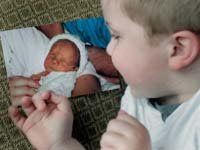 Hundreds of women endure shame because of pregnancy loss or not being able to carry a pregnancy to full term. Here are plain facts about miscarriage and how you can prepare your body physically to avoid some of the health pitfalls that bring about pregnancy loss.
Hundreds of women endure shame because of pregnancy loss or not being able to carry a pregnancy to full term. Here are plain facts about miscarriage and how you can prepare your body physically to avoid some of the health pitfalls that bring about pregnancy loss.A tiny mobile hangs above an empty snow-white crib covered in pink baby blankets. Nearby, a stuffed bear sits on a shelf above a wooden changing table with diapers already stacked ceiling high. Twilight filters in through a cracked window, announcing the end of the day.
It is time to put the baby to bed.
But unlike millions of other households — whose parents will have the opportunity to gently lull their little one to sleep in a rocking chair — in this household there will be no sweet face to tuck under the blankets, no bedtime stories to read, no hugs to receive, no warm body to hold, and no cries to awake the new parents in the middle of the night. The room will sit motionless, empty — a mere preparation made in expectation of a child who never arrived.
The couple — once excited, but now in anguish — will slowly go to bed, walking with longing past the nursery.
For 25% of couples, their dream of bearing a child can easily turn into an emotional nightmare. After learning they are pregnant, 25% of women have a first trimester pregnancy loss. Generally, after a miscarriage, a woman is able to have several healthy children.
But for another 15%, it can lead to disappointment upon finding out they are unable to carry a child to full term. All the preparation and excitement become a thing of the past. What the couple may have been planning for since their wedding day — the possibility of a houseful of several happy, bright-eyed children — becomes a distant dream.
The couple is left with a decision: (A) Try again, which can include extensive doctor visits, fertility drugs, scheduled sexual relations, close monitoring of the woman’s cycle, various blood tests to determine if either party has any type of infection, a dilation and curettage procedure, taking the man’s sperm count, any variety of medical surgeries and examining options such as in vitro fertilization.
Or (B) live without bearing their own children.
Many couples choose the former, seeking at all costs to have their own baby — which, after spending thousands of dollars and years of trying without success, can set them up for even greater disappointment later, especially if the couple discovers they are infertile.
After consistently trying for one year to get pregnant, but to no avail, the couple feels like a failure, with some feeling they have been denied their God-given role to become parents.
But as statistics show, one miscarriage does not necessarily mean the couple will be completely infertile. The flipside of the 15% statistic is that 85% will bear children without any complications.
But what exactly does miscarriage mean for the thousands of women who have one? Before becoming overly discouraged, it is important to get the facts on the reasons behind miscarriages and what a couple can do to physically prepare for a healthy baby.
Full article: http://www.realtruth.org/articles/080502-001-cwm.html
Stories of Pregnancy & Birth over 44y
- Daily blog of hope & inspiration!
http://pregnancyover44y.blogspot.com/
4,600 Stories of Pregnancy & Birth over 44y
Daily blog of hope & inspiration!
http://pregnancyover44y.blogspot.com/
You Can Get Pregnant in Your 40's
Sharing articles, discussing options & suggestions
http://youcangetpregnant.blogspot.com/
Recent Keyword Searches: miscarriage rate age 45, can i exercise while ttc after miscarriage, late miscarriage sperm quality, misdiagnosed miscarriages, give up after recurrent miscarriages, multiple miscarriages folic acid
No comments:
Post a Comment